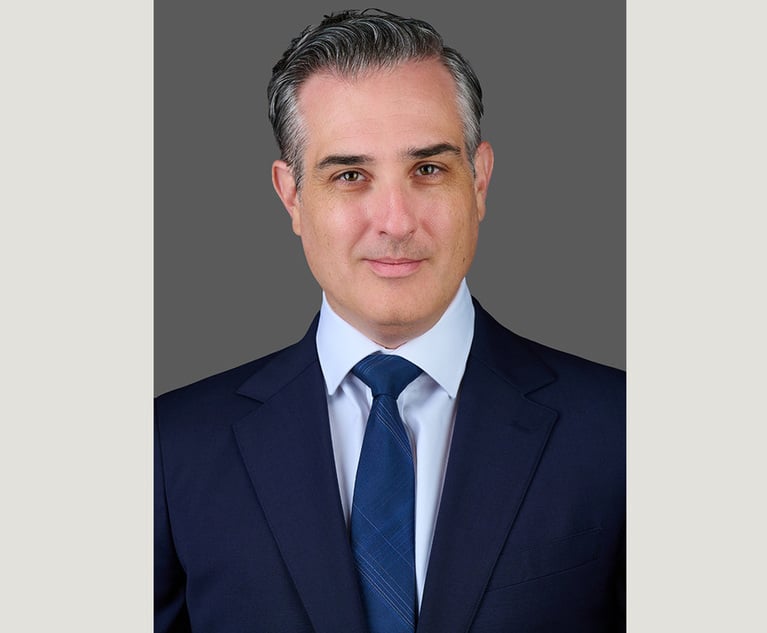$30M Accord Reached With AT&T, Others Over Technician's Fall From Cell Tower
AT&T and other companies have agreed to pay a total of $30 million to a technician who fell 50 feet down from a telecommunications tower, leaving him incapacitated.
May 21, 2018 at 06:31 PM
4 minute read

AT&T and other companies have agreed to pay a total of $30 million to a technician who fell 50 feet down from a telecommunications tower, leaving him incapacitated.
The settlement was announced by Kline & Specter, which represented the guardian of Thomas Jeglum, who is currently in a full-time neurological rehabilitation facility in California.
Jeglum's guardian, Russell Marshall, sued AT&T, its subsidiary New Cingular Wireless PCS and engineering company B+T Group related to the Allentown cell tower alleging that their negligence led to a ladder rung dislodging, causing Jeglum to fall.
“The family of Tommy Jeglum and we are gratified that we were able to adequately compensate him and provide for first-class care for the rest of his life,” Shanin Specter said in a statement issued Monday.
Along with Specter, Jeglum was represented by attorneys Michael A. Trunk and Patrick J. Fitzgerald, also of Kline & Specter, and their co-counsel in the litigation, Robert Buccola, Jason Sigel and Marshall Way of the northern California firm of Dreyer Babich Buccola Wood Campora. The case was filed in the Philadelphia Court of Common Pleas.
William J. Conroy of Campbell Campbell Edwards & Conroy in Berwyn represents AT&T and referred a request for comment to an AT&T spokesman.
“We are glad this case involving one of our vendors has been resolved. We hire companies that are experts at tower construction and maintenance, and require them to abide by standards that reflect our focus on worker safety,” the spokesman said in an email Monday. ”In addition to strict compliance with state and federal laws and regulations, our contractors must fully train and conduct background tests on those working on our projects. Contractors who violate the conditions of their contracts are subject to termination.”
The accident occurred June 15, 2013, when the then-23-year-old Jeglum was working on the tower, preparing to install telecommunications equipment. While climbing to the top of the tower and wearing a climbing harness, the rung to which Jeglum was attached broke off, according to court papers.
Jeglum was in a coma for several months and sustained a permanent traumatic brain injury and fractures to his pelvis, spine, arm and legs. Marshall claimed that AT&T was at fault for not having a safe, permanent climbing apparatus installed on the tower.
“Despite the fact that the vast majority of its telecommunications towers in the region—as many as 95 percent—had a permanent safety climb system, at no point did AT&T install a permanent safety cable on the Woodlawn tower,” the plaintiffs' court papers said.
AT&T said in its court papers that periodic inspections of the towers are performed, and there were no concerns raised about the Woodlawn tower prior to the 2013 accident.
“Those periodic assessments consisted of assessing the overall condition of the site, including inspecting the equipment housed within the shelter at the base of the tower, inspecting the tower base and foundation for structural damage and integrity, and checking ground components for rust and corrosion. An AT&T radiofrequency field technician, Eric Schaffer, conducted such an inspection on Jan. 8, 2013, just six months prior to the subject accident, and he did not identify any concerns regarding the tower,” AT&T's court papers said.
B+T Group, which includes subsidiary BTE Management Group, said in its own court papers that “the BTE defendants were never hired to perform a safety inspection of the Woodlawn Tower.”
“The evidence adduced in discovery has shown that the BTE defendants were retained to perform geotechnical investigation, foundation mapping with rebar investigation, and tower mapping,” the BTE defendants said in their court papers. “The purpose of the tower mapping was to perform a structural analysis which would include preparation of construction drawings for the equipment to be installed on the tower. None of these tasks involved performing a safety inspection of the tower and informing AT&T or Jacobs of any safety issues. The BTE defendants were also not expected to perform a safety inspection, as it was not within the scope of work which they were contracted to perform.”
Counsel for the BTE defendants, Cathleen Rebar of Stewart Bernstiel Rebar & Smith, could not immediately be reached for comment.
This content has been archived. It is available through our partners, LexisNexis® and Bloomberg Law.
To view this content, please continue to their sites.
Not a Lexis Subscriber?
Subscribe Now
Not a Bloomberg Law Subscriber?
Subscribe Now
NOT FOR REPRINT
© 2025 ALM Global, LLC, All Rights Reserved. Request academic re-use from www.copyright.com. All other uses, submit a request to [email protected]. For more information visit Asset & Logo Licensing.
You Might Like
View All

'Taking the Best' of Both Firms, Ballard Spahr and Lane Powell Officially Merge
6 minute read

Trending Stories
- 1The Importance of Contractual Language in Analyzing Post-Closing Earnout Disputes
- 2People in the News—Jan. 8, 2025—Stevens & Lee, Ogletree Deakins
- 3How I Made Partner: 'Avoid Getting Stuck in a Moment,' Says Federico Cuadra Del Carmen of Baker McKenzie
- 4Legal Departments Dinged for Acquiescing to Rate Hikes That 'Defy Gravity'
- 5Spalding Jurors Return $12M Verdict Against State Farm Insurance Client
Who Got The Work
Michael G. Bongiorno, Andrew Scott Dulberg and Elizabeth E. Driscoll from Wilmer Cutler Pickering Hale and Dorr have stepped in to represent Symbotic Inc., an A.I.-enabled technology platform that focuses on increasing supply chain efficiency, and other defendants in a pending shareholder derivative lawsuit. The case, filed Oct. 2 in Massachusetts District Court by the Brown Law Firm on behalf of Stephen Austen, accuses certain officers and directors of misleading investors in regard to Symbotic's potential for margin growth by failing to disclose that the company was not equipped to timely deploy its systems or manage expenses through project delays. The case, assigned to U.S. District Judge Nathaniel M. Gorton, is 1:24-cv-12522, Austen v. Cohen et al.
Who Got The Work
Edmund Polubinski and Marie Killmond of Davis Polk & Wardwell have entered appearances for data platform software development company MongoDB and other defendants in a pending shareholder derivative lawsuit. The action, filed Oct. 7 in New York Southern District Court by the Brown Law Firm, accuses the company's directors and/or officers of falsely expressing confidence in the company’s restructuring of its sales incentive plan and downplaying the severity of decreases in its upfront commitments. The case is 1:24-cv-07594, Roy v. Ittycheria et al.
Who Got The Work
Amy O. Bruchs and Kurt F. Ellison of Michael Best & Friedrich have entered appearances for Epic Systems Corp. in a pending employment discrimination lawsuit. The suit was filed Sept. 7 in Wisconsin Western District Court by Levine Eisberner LLC and Siri & Glimstad on behalf of a project manager who claims that he was wrongfully terminated after applying for a religious exemption to the defendant's COVID-19 vaccine mandate. The case, assigned to U.S. Magistrate Judge Anita Marie Boor, is 3:24-cv-00630, Secker, Nathan v. Epic Systems Corporation.
Who Got The Work
David X. Sullivan, Thomas J. Finn and Gregory A. Hall from McCarter & English have entered appearances for Sunrun Installation Services in a pending civil rights lawsuit. The complaint was filed Sept. 4 in Connecticut District Court by attorney Robert M. Berke on behalf of former employee George Edward Steins, who was arrested and charged with employing an unregistered home improvement salesperson. The complaint alleges that had Sunrun informed the Connecticut Department of Consumer Protection that the plaintiff's employment had ended in 2017 and that he no longer held Sunrun's home improvement contractor license, he would not have been hit with charges, which were dismissed in May 2024. The case, assigned to U.S. District Judge Jeffrey A. Meyer, is 3:24-cv-01423, Steins v. Sunrun, Inc. et al.
Who Got The Work
Greenberg Traurig shareholder Joshua L. Raskin has entered an appearance for boohoo.com UK Ltd. in a pending patent infringement lawsuit. The suit, filed Sept. 3 in Texas Eastern District Court by Rozier Hardt McDonough on behalf of Alto Dynamics, asserts five patents related to an online shopping platform. The case, assigned to U.S. District Judge Rodney Gilstrap, is 2:24-cv-00719, Alto Dynamics, LLC v. boohoo.com UK Limited.
Featured Firms
Law Offices of Gary Martin Hays & Associates, P.C.
(470) 294-1674
Law Offices of Mark E. Salomone
(857) 444-6468
Smith & Hassler
(713) 739-1250





